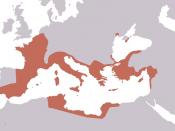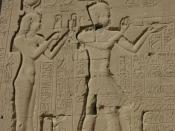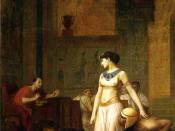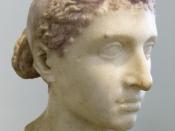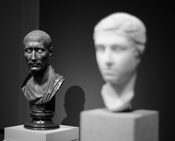Over the past two thousand years there have been many women in history that have captivated our minds through their life story, but none can compare with Cleopatra the Seventh, who still intrigues and fascinates us today. Arguably the most famous queen in history, she was not only charming and beautiful, but also a powerful political woman that masterfully utilized her skill to rule Egypt. She possessed an ability to sway the mind of leaders to gain support for Egypt, which was intimidating to many of her enemies, specifically the Roman's, who feared her the most. Roman history paints her as an evil, lustful siren, which lured men like their great leaders Julius Caesar and Mark Antony, to destruction. Even though the attacks against her were cruel and vicious, it did not prevent the Egyptian people from worshipping Cleopatra. They called her the mother of all mankind the goddess Isis, because of her powerful and courageous stance against Roman aggression towards the Egyptian kingdom.
Her presence was imperative to the clash between East and West, who were both trying to control the Mediterranean world.
Today she is still recognized as the key political force that played a crucial role at a crucial time in history.
Princess Cleopatra, whose name means "glory to her race," was born in 69 B. C. and was the daughter of King Ptolemy XII, the last king to rule the Macedonian Greek dynasty created in 323 B. C. by Alexander the Great. She grew up one of six children in the luxury of the royal palace in Alexandria, a vast cluster of Greek-colonnaded buildings surrounded by beautiful gardens and fruit trees that lay close to the harbor and was cooled by the sea breeze from the Nile River. Near the palace where she lived were beautiful multi-colored stone and marble buildings that contained museums, gymnasiums, zoological gardens with exotic animals and libraries filled with collections of some 400,000-papyrus scrolls, comparing all the great literature of the Mediterranean world. There she consumed herself with all of the resources that were available to her, becoming educated in the history of Greek and Egyptian myths of gods and goddess, and Mediterranean culture. As she grew older, she pursued a more advanced level of education, spending most of her time in the museum talking to scientists, doctors, philosophers, and writers learning literature, the arts, science and medicine. She learned to speak multiple languages such as Arabic, Hebrew, Jewish and the native Egyptian tongue, which made her the first Ptolemy to do so. Learning these languages enabled Cleopatra to communicate with her Egyptian subjects and many of the settlers in Alexandria. Like her father she was especially interested in the philosophy of governing that sought to justify kingship and to demonstrate how to be a strong yet benevolent ruler. This unusual education helped in forming Cleopatra's own ideas of how she would one-day rule the kingdom of Egypt.
Cleopatra's father, King Ptolemy XII, was a very weak ruler and was not respected or impressed by the Egyptian people. They found him neither kingly nor godly and called him the "Flute Player," because of his fondness for wine and passion for playing the flute and dancing in the streets during festivals honoring the joy-giving god Dionysus. Seeing how little respect the Egyptian subjects showed her father caused Cleopatra become concern with the decline of the kingdom, She knew that the Egyptian army was inadequate and could not consistently control the sporadic outbreaks of the Alexandrian mobs. Also, she dreaded falling to the growing menace of the Roman Empire in the west, fearing that the past appeals for military help by Ptolemy kings had jeopardized and weakened the Egyptian kingdom. Cleopatra vowed that when she grew up, she would not let the Romans use her or make her country a Roman province-rather, she would use them in any way she could to make Egypt the proud leader of the Mediterranean world it once had been.
By 59 B. C. Cleopatra's worst fears had become reality, the Roman Republic lead by three power hungry politicians, Julius Caesar, Pompey, and Crassus began expanding their control of the eastern world and set their sights on the wealthy land of Egypt. Her father, King Ptolemy XII, made several efforts to stave off Roman takeover of Egypt, negotiating deals with the Roman leaders to support his claim to the throne. For six years Alexandria returned to its normal state, but eventually Egypt became a mere puppet state under the control of far-off Rome.
In 51 B. C. Cleopatra's father died and left his throne jointly to Cleopatra, now eighteen, making her Cleopatra VII and to her half brother, now ten, making him Ptolemy XIII. As part of the Ptolemies custom to maintain purity and divinity, Cleopatra was required to marry her younger brother to prevent any commoner from contaminating the royal family. She tried to avoid the marriage, but the old custom in the royal family was too entrenched and her brother's guardians would not let her get away with such independence. After many debates, Cleopatra reluctantly married her younger brother and began her reign as Queen of Egypt.
Despite the emphasis on brother-sister rule, Cleopatra ruled as though she was the one and only monarch. In her first year as Queen the Nile River failed to produce its annual flooding and few crops had grown and starvation was threaten the people. The menace of Rome was present and there was unrest in Alexandria. She knew that her brother was not capable of coping with all the problems she had inherited, so she continued to make decisions independent of her brother and his guardians. Cleopatra had so much love and compassion for the Egyptian people that she decided to venture outside the confines of her city to see what Egyptian life was like. It would be a most unusual adventure for her.
Upon returning to Alexandria, Cleopatra found a growing discontent with her actions. A plot to get rid of her was being hatched by the guardians of her brother, who were scheming to gain control of the throne for themselves. She eventually was forced to flee and her brother proclaimed sole ruler of Egypt. It was not until Julius Caesar's rise to power in 49 B. C. that Cleopatra would regain her reign as Queen of Egypt. While visiting Alexandria, Julius Caesar and Cleopatra met and they were immediately attracted to each. Why? Some compelling reasons for their desire for each other lied within their similar ambitions to rule the world. That Caesar was now the most powerful commander in the Mediterranean World was part of his charm for Cleopatra. That Cleopatra belonged to a splendid royal dynasty connected with Alexander the Great and was Queen of the wealthiest country in this same world was an attraction for Caesar.
Cleopatra was confident that this great military hero could restore her to power and fulfill her dream of reviving Egypt's past glories and Caesar was sure that the glittering prize of Egypt was his for the future. They became lovers almost immediately.
Not long after Caesar's departure for Rome, Cleopatra gave birth to their son Ptolemy Caesar, nicknamed Caesarion, or little Caesar by the Alexandrians. For two years they stayed apart from each other, Cleopatra continued to tend to the affairs of Egypt and raising their son and Caesar continued his quest to take over the eastern Mediterranean world. Finally, in 46 B. C. Cleopatra was summons by Caesar to visit him in Rome. She arrived with their son Ptolemy Caesar and her younger brother. Immediately Caesar showed an attachment to Cleopatra, which did not go over well with the conservative Roman people. Many of them feared that Caesar would marry Cleopatra, which was taboo in Rome and went against their tradition. They believed that Cleopatra would encourage Caesar to create a monarchy and become king, putting and end to the Roman Republic. The rumors of Cleopatra's influence on Caesar to become king and the fear of the capital city being moved from Rome to Alexandria generated rebellion within the Roman Senate. In the winter of 44 B. C., not long before the senate was to meet on the ides (or fifteenth of March, a conspiracy began to form behind closed doors. "Tyranny must end, Caesar must die," was whispered among the conspirators. On March 15 44 B. C. during a senate meeting Caesar was murdered by members of the senate. The news of Caesar's death devastated Cleopatra. She had lost her lover, the father of her son, and her protector. All of her hopes were dashed and her future was murky and uncertain. As soon as she could, she set sail for Egypt.
Although Cleopatra was deeply moved by the death of Caesar, she was determined, at all costs, to keep Egypt's independence and try to regain its lost overseas possessions; Cyprus, Syria, Judaea, Palestine, and Lebanon. But she knew she needed some strong military man to take Julius Caesar's place, a new consort to stand by her lest Rome once more try to grab her kingdom. She listened eagerly to any news from Rome brought by sailors or merchants; she even sent scouts there to gather information.
As she eagerly waited for an answer to the condition of Rome, Mark Antony and Octavius developed a second Triumvirate to rule the Roman Empire. Mark Antony became ruler of the Mediterranean east, while Octavius took charge of the west in Italy, and Lepidus took a small portion of Roman Provinces. Shortly after taking command in the east, Mark Antony summons Cleopatra to come and see him in the town called Tarsus on the bank of the river Cyndus. Cleopatra did not answer his first summons. But finally, knowing that Egypt's fate depended on which Roman commanded the East, she accepted. She took her time, to prepare a spectacular arrival and to use all her womanly arts to impress and captivate Mark Antony. Once she arrived in Tarsus Cleopatra and Mark Antony worked hard to impress each other, feasting on fine foods, wine, and music. Knowing that they could help each other, they became political partners and eventually lovers.
Now that Cleopatra had the ruler of the east by her side, her dream of maintaining the right to rule Egypt and return her kingdom to its past power and glory was secure. For nearly ten years Cleopatra and Mark Antony shared a love/political relationship, giving each other the necessary support to accomplish their goal. During their time together Cleopatra gave birth to three children for Mark Antony, first in 40 B. C. a boy named Alexander and a girl name Cleopatra. Their third child was born later in 36 B. C. and was named Philadelphus.
By 33 B. C. after an embarrassing failed attempt to conquer the Pathians Mark Antony and Cleopatra's dream of becoming the second Alexander the Great were dashed. Also the so-called Triumvirate came to an end when Octavius, without consulting Mark Antony, finally dismissed the third member. Now that the Mask was off a bloody civil war was imminent between the two.
In 31 B. C. the inevitable happened, war between Octavius and Mark Antony broke out, which would lead to the destruction of both Cleopatra and Mark Antony. After fierce land and sea battles, Mark Antony was cornered and out of desperation committed suicide and later died in the arms of Cleopatra. The same destiny would come to Cleopatra after she was captured by Octavius and thrown in prison. Being true to her fate Cleopatra arranged a dramatic and unforgettable death scene. After bathing, she dressed her self exquisitely as the Queen of Egypt-goddess Isis in her cobra crown and lay down on a sumptuous golden couch to partake of her last meal. She was later discovered lying dead with three of her faithful servants in her chamber. The year 30 B. C. marked the day that ended the Macedonian Geek Dynasty's rule of Egypt and the life of Cleopatra 7th.
